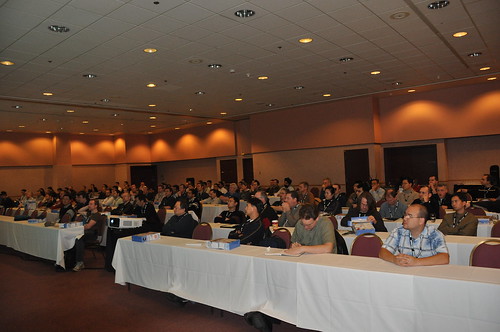
Mark Arteaga on A Platform in your Pocket at Microsoft Tech Days

 While the smartphone market has grown exponentially with the advent of the iPhone, Blackberries and even the nascent Android platform, not much has been heard about Windows Mobile. But that’s because while Windows Mobile has over 140 different devices on the market running the platform, including many consumer devices, Redmond has shifted focus to the enterprise sector. Many devices running Windows Mobile are finely tuned and adapted for hazardous environments and require ruggedized, specialized devices.
While the smartphone market has grown exponentially with the advent of the iPhone, Blackberries and even the nascent Android platform, not much has been heard about Windows Mobile. But that’s because while Windows Mobile has over 140 different devices on the market running the platform, including many consumer devices, Redmond has shifted focus to the enterprise sector. Many devices running Windows Mobile are finely tuned and adapted for hazardous environments and require ruggedized, specialized devices.
Mark Arteaga, one of the premier Windows Mobile Solution Specialists, in North America, was on hand at Microsoft Tech Days, held at the Vancouver Convention Centre, to explain the many ways developers can use Windows Mobile to craft mobile solutions over a variety o devices.
The good news for developers, Arteaga said, is the actual development experience on the desktop is much the same as developing for mobile devices, other than some device-specific tools. But there’s no need for an actual physical device, as there are perfectly decent emulators available with which you can test your code.
But Windows Mobile also has its own classes specific to its SDK, such as Pocket Outlook, Forms, and Telephony specific code. It also has subtle differences, such as the lack of a letter assignment to a storage drive. The device is designated with a “/”, while a memory card becomes a folder on the device.
Another difference is that there are fewer controls in Mobile than in the full Visual Studio Framework, though it is possible to customize those controls. There are also different classes of emulator, from Smartphone to Classic, which vary according to whether the device you develop for is a simple PDA, a device with a physical keyboard or a touch screen configuration.
Arteaga also cited Windows Mobile Device Center as an important tool for developers, since it allows you to browse and manipulate tools on the device from the desktop.
Since Windows Mobile is concentrating on the enterprise, it makes sense that Microsoft has created SQL Server Compact, which is is contained as one installable CAB file. SQL Server is free, and besides syncing with the backend, it’s also a great way to store your data offline and make queries within mobile applications, Arteaga said. It also allows data encryption and is more compact than XML.
Many developers also have existing desktop code, and Arteaga said that sharing that code is the best way to gain competitive advantage and since Windows Mobile is .Net code, there isn’t much of a learning curve when adapting to the mobile platform.




